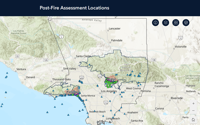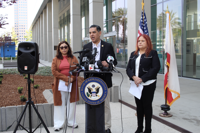
Zócalo Health's CEO and co-founder Erik Cardenas, who was inspired to create a community-based primary care provider after helping his parents navigate the U.S. healthcare as a kid. Photo courtesy of Amber Moore
Latino adults are significantly more likely to experience delays in accessing medical care than other groups, according to a new report.
Barriers like cost and language and being uninsured are just some of the reasons many Latinos fall behind in getting care.
One in six Latinos living in California reported being in fair or poor health, according to the 2024 California Health Care Foundation’s “Health Disparities by Race and Ethnicity,” almanac and report. Based on the findings, in 2021, 18% reported not having a usual source of care, and 15% delayed care. Of those who delayed, 38% reported cost or lack of insurance as the reason.
A community-based primary care provider known as Zócalo Health looks to bridge the gap between Latinos and adequate and culturally relevant health care.
The establishment of Zócalo Health, according to CEO and co-founder Erik Cardenas, was motivated by the recognition that the United States healthcare system was largely one-size-fits-all and that Latinos, undocumented immigrants and many elderly Spanish speakers find it extremely challenging to navigate.
Cardenas, along with Mariza Hardin, Zócalo Health’s chief operating officer and co-founder, joined forces to create a care-provided initiative where patients felt seen, spoke their language, delivered compassionate care and aligned with Latino culture.
“The healthcare system is not just accessing insurance, which the state of California is leading the way in providing access to health insurance for Latinos, especially the undocumented populations and that is great. But it's more than that. It's more than just having an insurance card. It's more than just having access to a doctor. It's being able to navigate what historically has been a very fragmented health system,” Cardenas told CALÒ News. “A lot of people in our communities are not only facing health concerns and mental health concerns but also social needs, which many times are the first set of barriers that prevent people from engaging in a high-value pattern of care. We wanted to change that.”
Cardenas, who had worked in other healthcare initiatives such as Tenet Health, EverlyWell and Amazon Care for the last 23 years and Hardin, who worked for the U.S. Health and Human Services Department, Optum Health, Omada and most recently Amazon, realized the disparities among the one-size-fits-all system that these companies continued to drive forward.
Combining their experiences, they decided to launch Zócalo Health, a name that, according to Cardenas, stemmed from the idea that healthcare should assimilate a zócalo, a community space where people felt proud and welcomed to not only access healthcare but also other social needs like housing and food assistance programs that are closely linked to people's wellbeing.
“In Mexico City, el zócalo is a town square where people get together for everything and build their trusted community,” he said. “I wanted to incorporate that into healthcare and build a brand that represented the community and not just this institutional or super sterile type of healthcare brand that just didn't feel like our own.”
Cardenas' parents are originally from a small town outside Monterrey in the state Nuevo Leónof, Mexico. When his parents immigrated to the U.S., he recalls experiencing what many kids of undocumented parents go through: the constant translating of medical documents, being a translator between the doctors and patients and advocating for their parent's care. “It was very difficult to navigate,” he said.
With a care team consisting of doctors, nurses and mental health specialists, Zócalo Health offers patients access to both in-person and virtual care in specific locations through a membership model that is accessible to anyone with Medi-Cal. Care that Zócalo can provide stems from primary care, including mental health conditions, preventative and lifestyle needs, chronic disease management and urgent care.
One of Zocalo’s most culturally comprehensive components is their promotoras de salud(health promoters), who are local community members who assist and coach patients through their care journey.
Cardenas explained that promotorasare trusted community individuals who sit down with patients and identify the patient's individual and exclusive health plan as well as helping them sign up for other social services, including housing accessibility, food programs or any other basic needs promoters that the patient might need.
“Promotoras help remove barriers like language or cultural barriers that often block meaningful engagement between health care providers and patients. A combination of promotoras [and] Spanish-speaking doctors and nurses really allows us to be a little bit more effective in helping people go through that continuum of care,” Cardenas said. “In the healthcare system, doctors are incentivized to see more people and therefore spend less time with patients. We aren't incentivized by that. We spend time focusing on family-based care. We know that a lot of Latino families make healthcare decisions collectively. Our model is built on engaging the entire household.”
More recently, Zócalo Health increased its work to help its patients allocate and identify basic need resources that many of them are in desperate need of. “Many of our clients come in with physical pain, stress, and mental health issues, and under all of that are sometimes cases where they are housing insecure, do not have enough to pay their rent or are facing other life-changing social issues,” Cardenas said. “Housing insecurity is one of the most significant drivers of poor health outcomes, especially in underserved Latino communities. When families don't have stable housing, everything else—chronic disease management, mental health, access to care—falls apart.”
Last month, Zócalo Health announced it became a California Advancing and Innovating Medi-Cal (CalAIM) Community Support Provider. This service enables Zócalo to provide critical housing support services to Medi-Cal members across California.
By adding housing support to its existing Enhanced Care Management (ECM), Community Health Worker (CHW) benefits program, and primary care services, Zócalo Health delivers the holistic, wraparound care members need to achieve stability and better health outcomes.
According to Cardenas, examining the relationship between housing insecurity and health disparities is crucial,, since many Latinos who experience mental health issues, chronic illnesses and frequent ER visits are also victims of evictions and other housing-related problems.
“ I would say about 40 percent of the people that we see report housing insecurity,” Cardenas said. “In our experience, members who need both medical care and housing assistance are all too often forced to navigate fragmented systems that don’t communicate with each other. By integrating housing support directly into our care model, we provide a seamless experience that ensures our members get the services they need when they need them, without unnecessary barriers. This is the future of whole-person care.”
The Zócalo Health’s Community Supports Program is designed to help members secure and maintain stable housing, reducing preventable hospitalizations and improving overall quality of life. Some of these services include helping members find and secure housing with personalized assistance, including housing search support, application assistance and move-in coordination by providing financial support for security deposits.
Today, Zócalo Health is quickly expanding across the state of California, including Los Angeles County.
To learn more about enrolling in Zócalo Health, go to www.zocalo.health/patients.











(0) comments
Welcome to the discussion.
Log In
Keep it Clean. Please avoid obscene, vulgar, lewd, racist or sexually-oriented language.
PLEASE TURN OFF YOUR CAPS LOCK.
Don't Threaten. Threats of harming another person will not be tolerated.
Be Truthful. Don't knowingly lie about anyone or anything.
Be Nice. No racism, sexism or any sort of -ism that is degrading to another person.
Be Proactive. Use the 'Report' link on each comment to let us know of abusive posts.
Share with Us. We'd love to hear eyewitness accounts, the history behind an article.